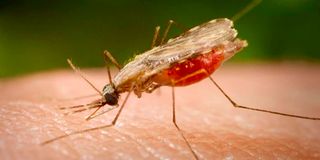No, blood group O is not a mosquito magnet

Some people believe that mosquitoes gravitate towards people with blood group O more than any other blood group.
What you need to know:
- There are four major blood types; A, B, AB and O. All these classifications are determined by genetic factors, mostly inherited from parents.
Have you ever wondered whether mosquitoes find your blood irresistible than everyone else’s? That your blood is some sort of magnet that attracts the tiny, annoying, singing insects. If you scroll on social media –especially on Tiktok, there are a number of videos insinuating that your blood group could be a possible sellout. Some people believe that mosquitoes gravitate towards people with blood group O more than any other blood group.
Well, here is what you need to know.
First, let’s understand what blood groups are.
There are four major blood types; A, B, AB and O. All these classifications are determined by genetic factors, mostly inherited from parents. The blood groups are subdivided into either Rhesus positive or negative. Blood group O is the most common type.
But why do people believe that blood group O attracts mosquitoes?
The assertion that mosquitoes love people with blood group O started in the 1970s through scientific studies. One of the first studies, published in the scientific journal Human Biology in September of 1974, shows that a female malaria causing vector –Anopheles gambiae - tends to feed on more people with blood group O. The study did not give reasons for this. The conclusion was based on an analysis of blood group data analysed from the blood that the mosquitoes had fed on.
In another study published in 2004, which slightly differs from the earlier one, the researchers counted the number of landings of mosquitoes on different people. Those with blood group O had the most landings.
“Even the landing tests do not provide an explanation for the landing preference among blood groups, and there may be other unknown influences underlying the differences in landing preferences,” the study showed.
The mosquito vector that was used in this second study - Aedes albopictus - is not a vector that causes malaria, but it can cause other diseases like dengue, zika and chikungunya.

Anopheles mosquito. It is the main vector for malaria.
Another study published in 2021 in the scientific journal Nature Scientific Reports was first corrected and then retracted in June 2022. It had highlighted that female mosquitoes prefer blood group B, but the researchers found blood group O to have a high digestibility rate.
What do scientists say?
Healthy Nation spoke to Dr Eric Ochomo, an entomologist and deputy director, Centre for Infectious and Parasitic Disease Control Research, at Kemri.
His answer was –mosquitoes do not care about one’s blood group.
But, there is more.
He explains that mosquitoes are attracted to humans due to a range of factors including body odour -not really bad smell, but the complex volatiles emitted from our skin. These smells can be due to a range of factors including diet, sweat and sometimes, genetic factors.
Mosquitoes are also attracted to warmer bodies. Dr Ochomo explains that even though we say the normal temperature is 37 °C, it actually ranges between 36.4 °C to 37.2 °C. This is why some people feel warmer than others, and mosquitoes can tell who the warmer ones are.
The other common reason a mosquito may be attracted to you is because of carbon dioxide. He says that a major source of attraction for mosquitoes is the air we exhale. When you sleep at night and breathe out, you are clearly singing to the tune of the mosquitoes.
He says that while some studies have postulated blood group O as being more attractive, their results are not conclusive; and that the results above play a much greater role.
Jonathan Day, Emeritus Professor of Medical Entomology at the University of Florida, wrote in the Conversation that generally, mosquitoes use their sight, sound and their sense of smell, to identify a potential source of blood. He explains that for carbon dioxide, since there are different sources of carbon dioxide like cars, mosquitoes are smart enough to know which one is from a human being, and which one is from a non-living organism that will not offer much help in terms of blood.
“Metabolic processes like breathing and moving generate these scent cues, including lactic acid, ammonia and fatty acids that act as additional olfactory clues that help female mosquitoes zero in on their next blood meal,” he explains.
For the body odours, he says that some mosquitoes could be attracted to how one’s feet smells, and that is a tactical way of ensuring that you won’t wake up from your sleep.
So, how do we keep the malaria-causing mosquitoes away regardless of the blood type?
There are different ways to keep them at bay. Scientists have worked so hard to ensure that we have vaccines. In 2021, the World Health Organization approved the first-ever malaria vaccine, which has already been rolled out for use in children in the country.
There are other traditional ways of malaria prevention such as the use of insecticide treated nets, mosquito repellents and insecticides.
In December last year, Dr Ochomo and his team from Kemri introduced a new spatial repellent that is hung on a wall like a photo frame to keep mosquitoes at bay. It has the same concept like a mosquito coil, only that it does emit any smoke, and it lasts for a month. It does not prevent the bites by keeping mosquitoes away from human beings, it actually kills them.

